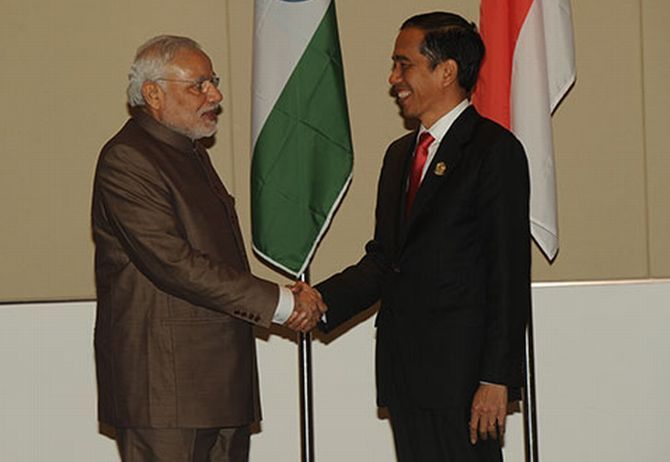It is often said that the India-Indonesia relationship is overshadowed by mutual neglect.
Jokowi's visit has the potential to rejuvenate a most under-rated relationship, says Dr Rahul Mishra.

Indonesian President Joko Widodo, famously known as Jokowi, is paying his first-ever State visit to India from December 12.
Though Prime Minister Narendra Modi and Jokowi met at a bilateral meeting on the sidelines of the 9th East Asia Summit on November 13, 2014, in Nay Pyi Taw, Myanmar, this will be the first substantive meeting between the two leaders.
There has always been frequent exchange of high-level visits between the two sides. Most recently, in 2015, Vice-President Hamid Ansari visited Indonesia.
Despite regular meetings between the two sides, it is often said that the India-Indonesia relationship is overshadowed by an element of mutual neglect.
Jokowi's visit has the potential to rejuvenate what is otherwise called as one of the most under-rated relations. The visit is significant for the following 5 reasons:
First, bilateral trade has gone down from $21.44 billion in 2011 to $15.95 billion in 2015, whilst, during the same period, the trade deficit has gone up from $8.08 billion to $10.31 billion.
Also, both countries could not achieve their set trade target of $25 billion by 2015.
Negotiations on a Comprehensive Economic Cooperation Agreement are also underway, but moving at a slow pace. It will take a while before it sees the light of the day.
While multilateral arrangements such as a Regional Comprehensive Economic Partnership are crucial for India's regional standing, bilateral mechanisms are equally important, given that India's Act East Policy is not only about ASEAN (Association of Southeast Asian Nations), but also about individual countries of East and Southeast Asia.
Paying required attention to bilateral mechanisms is particularly important in the case of India and Indonesia.
Both India and Indonesia are the largest countries in terms of size and economy in their respective regions.
In terms of purchasing power parity, India and Indonesia are the third and eighth largest economies respectively in the world.
It is expected that during the visit, deliberations on the early convening of the CECA and uplifting trade relations will take place.
Second, both countries are home to the largest and second largest Muslim populations in the world.
Therefore, while both countries have been two of the most tolerant countries in the world, they are vulnerable to threats of radicalisation and communal disharmony.
Both countries have been victims of terrorism and have suffered the menace of radicalism for a very long time.
Seemingly, Indonesia is well prepared to deal with the challenge and has been successful in de-radicalising its youth, both countries may step up cooperation for sharing intelligence.
Third, owing to their diversity and vast size, the two countries have been facing challenges pertaining to regional disparity and lack of inclusive growth.
While approximately 23 per cent of its people still live below poverty line in India, the figure is 11 per cent in Indonesia.
Uplifting the vast number of people living below poverty line still remains a challenge to both countries, though India needs to work harder.
Fourth, both countries have a vast coastline, and thus ensuring coastal security has been high on agenda for both countries.
Challenges such as natural disasters and maritime piracy have demanded attention of both India and Indonesia.
The Indian armed forces have expertise in humanitarian assistance and disaster relief operations and have extended help to countries such as Nepal and Fiji in recent times. Cooperation may be a step up in this field too.
Fifth, in the strategic domain, though both nations are not directly involved in the South China Sea dispute, they have huge stakes in maintaining peace and stability in the region.
Recent events such as China's uncompromising stand in the South China Sea and land reclamation activities pose a challenge to maintaining the strategic equilibrium in the region.
New Delhi and Jakarta must work together to bring in more synergy between Jokowi's 'Global Maritime Fulcrum' and India's Act East Policy.
Indonesia could substantially contribute to India's Sagar Mala Project, which was established in 2015 to modernise India's key ports and strengthen link with the Indian Ocean region and beyond.
There are still some aspects of India-Indonesia ties that need to be fully developed. Developing economic linkages, building intra-regional and regional connectivity, and bolstering cultural ties have been the fulcrum of Modi's foreign policy.
In fact, India-Indonesia relations can benefit a lot from all these aspects, provided a proactive approach to widen and deepen bilateral ties is adopted; an approach that is long-term, and practicable with clearly defined strategic, political and economic goals.
Jokowi's India visit gives both New Delhi and Jakarta an opportunity to mull over the long-term possibilities for India-Indonesia ties, and give a fillip to this age-old relationship.
Dr Rahul Mishra is a Research Fellow at the Indian Council of World Affairs.










